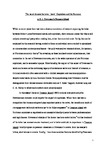"The worst dreams that ever I have": Capitalism and the Romance in R. L. Stevenson's Treasure Island
| dc.contributor.author | Sergeant, David | |
| dc.date.accessioned | 2016-12-06T15:53:11Z | |
| dc.date.available | 2016-12-06T15:53:11Z | |
| dc.date.issued | 2016-12 | |
| dc.identifier.issn | 1060-1503 | |
| dc.identifier.issn | 1470-1553 | |
| dc.identifier.uri | http://hdl.handle.net/10026.1/8074 | |
| dc.description.abstract |
<jats:p><jats:sc>While in recent years there</jats:sc>has been a slow accumulation of research exploring the links between Robert Louis Stevenson's work and capitalism, there remains a sense that this is still only an interesting byway when reading him, rather than a central route. Partly, this can be explained by this research having tended to focus on individual texts attached to specialised or circumscribed contemporary frames – the gold versus silver standard debate, for instance, or Victorian economic theory. As revealing as these localised contextualisations are, their connection to the rest of Stevenson's oeuvre, and to the wider operation of late Victorian capitalism, can be somewhat opaque. More broadly, the neglect of this aspect of Stevenson's work can be seen as the continuing legacy of his status as writer and theorist of romance, a fictional mode still often associated with a childish escapism and reactionary politics – despite recent work by Julia Reid and Glenda Norquay showing how Stevenson must be distinguished from fellow romance revivalists such as H. Rider Haggard, Andrew Lang, and G. A. Henty, to whom such epithets more properly apply.</jats:p> | |
| dc.format.extent | 907-923 | |
| dc.language | en | |
| dc.language.iso | en | |
| dc.publisher | Cambridge University Press (CUP) | |
| dc.title | "The worst dreams that ever I have": Capitalism and the Romance in R. L. Stevenson's Treasure Island | |
| dc.type | journal-article | |
| dc.type | Review | |
| dc.type | Journal | |
| plymouth.issue | 4 | |
| plymouth.volume | 44 | |
| plymouth.publication-status | Published | |
| plymouth.journal | Victorian Literature and Culture | |
| dc.identifier.doi | 10.1017/S1060150316000279 | |
| plymouth.organisational-group | /Plymouth | |
| plymouth.organisational-group | /Plymouth/Faculty of Arts, Humanities and Business | |
| plymouth.organisational-group | /Plymouth/Faculty of Arts, Humanities and Business/School of Society and Culture | |
| plymouth.organisational-group | /Plymouth/REF 2021 Researchers by UoA | |
| plymouth.organisational-group | /Plymouth/REF 2021 Researchers by UoA/UoA27 English Language and Literature | |
| plymouth.organisational-group | /Plymouth/Users by role | |
| plymouth.organisational-group | /Plymouth/Users by role/Academics | |
| plymouth.organisational-group | /Plymouth/Users by role/Researchers in ResearchFish submission | |
| dcterms.dateAccepted | 2015-07-01 | |
| dc.identifier.eissn | 1470-1553 | |
| dc.rights.embargoperiod | Not known | |
| rioxxterms.versionofrecord | 10.1017/S1060150316000279 | |
| rioxxterms.licenseref.uri | http://www.rioxx.net/licenses/all-rights-reserved | |
| rioxxterms.licenseref.startdate | 2016-12 | |
| rioxxterms.type | Journal Article/Review |


